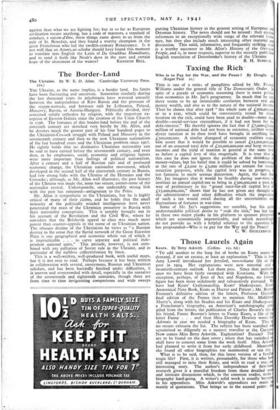The Border-Land
THE Ukraine, as the name implies, is a border land. Its limits have been fluctuating and uncertain. Somewhat similarly during the last thousand years its inhabitants have wavered uneasily between the independence of Kiev Russia and the pressure of the steppe-nomads, and between rule by Lithuania Poland, Muscovy, Russia, or Austria-Hungary. Politically divided, they remained solidly orthodox by religion, with the important ex- ception of Eastern Galicia since the creation of the Uniat Church in 1596. The fortunes of this border-land before the end of the sixteenth century are sketched very briefly by Mr. Allen, and he devotes much the greater part of his four hundred pages to the Ukrainian-Cossack struggle with Poland and Muscovy in the seventeenth century and then to the new Ukrainian nationalism of the last hundred years and the Ukrainian problem since 1917. He rightly holds that no distinctive -Ukrainian nationality . can be said to have existed before the seventeenth century, and even then, as he emphasises, social, economic and religious factors were more important than feelings of political nationalism. After a century and a half of Russian rule and of profound economic change, the Ukrainian nationalist movement, which developed in the second half of the nineteenth century in Russia, had few strong links with the Ukraine of the Hetmans and the Cossacks • although, as Mr. Allen well illustrates, the past history of the Ukraine was made the, none too secure, corner-stone of the nationalist revival. Unfortunately, one undeniably strong link with the past has remained—antagonism to the Poles. Mr. Allen is sympathetic to the Ukrainians, but he is highly critical of many of their claims, and he holds that the small minority of the politically minded intelligentsia have never penetrated the mass of the Ukrainian peasantry in Russia with their nationalist conceptions. This is notably brought out in his account of the Revolution and the Civil War, where he considers that the Bolshevik appeal to class was much more potent than counter-appeals in the name of an Ukrainian nation. The obscure destiny of the Ukrainians he views as "a Russian destiny in the sense that the fluvial network of the Great Eurasian Plain is one geographical and economic whole out of which it is impracticable . . . to carve separate and political inde- pendent national units." This attitude, however, is not com- bined with any palliation of Soviet rule in the- Ukraine, and in particular of the ruthless collectivisation by force.
This is a well-written, well-produced book, with useful maps, but it is not easy to read. Perhaps because it has been written in collaboration with several, anonymous, Russian and Ukrainian scholars, and has been hurriedly finished under difficulties, it is uneven and overcrowded with detail, especially in the narrative of the seventeenth and eighteenth centuries, though there are from time to time invigorating comparisons and wide sweeps
putting Ukrainian history in the general setting of European and Ottoman history. The notes should not be missed: they contain references to an exceptionally wide range of the relevant liter& Lure, but they also include much interesting other material and discussion. This solid, informative, and frequently striking Work is a worthy successor to Mr. Allen's History of the Georgia), People, and is, in most respects, superior to the recently published English translation of Doroshenko's history of the Ukraine.
B. H. SUMNER.






























 Previous page
Previous page